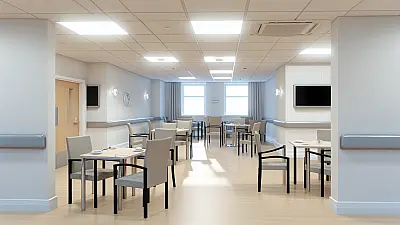ARCADIA, CA - Arcadia Health Care Center violated federal documentation requirements when staff failed to record whether they notified a resident's emergency contact during a middle-of-the-night hospital transfer, according to a February 13, 2025 complaint inspection.

Critical Documentation Failure During Emergency Transfer
The most significant violation occurred on January 29, 2025, when a resident with severe respiratory complications was transferred to the hospital at 2:00 AM. The resident, who had been admitted with encephalopathy, acute respiratory failure with hypoxia, and pneumonitis due to inhalation of food and vomit, required emergency medical care for a respiratory infection.
Licensed Vocational Nurse 1 (LVN 1) completed the transfer form but failed to document whether or when the resident's emergency contact was notified. During the inspection, LVN 1 stated they "did not remember the time" they contacted the emergency contact about the transfer.
The facility's Director of Nursing emphasized the critical nature of this oversight, stating "If it was not documented, it was not done" and explaining that notifications to residents' representatives must be documented on transfer forms.
Medical Vulnerability and Communication Requirements
This documentation failure is particularly concerning given the resident's severe medical conditions. The resident had encephalopathy, which affects brain function and communication abilities. Their January 16 assessment showed they were "rarely/never understood by others" and could "rarely/never understand others," making them completely dependent on staff for all personal care activities.
Acute respiratory failure with hypoxia means the lungs cannot adequately oxygenate the blood, a potentially life-threatening condition requiring immediate medical intervention. The resident also experienced pneumonitis from aspiration, which occurs when food or liquid enters the lungs instead of the stomach, causing dangerous inflammation and infection.
For residents with such complex medical needs and communication barriers, family notification becomes even more critical. Emergency contacts serve as advocates and decision-makers when residents cannot communicate their needs or understand treatment options.
Documentation Standards and Legal Requirements
Federal nursing home regulations require comprehensive documentation of all resident care and significant events. The facility's own policy states that "all services provided to the resident, or any changes in the resident's medical or mental condition, shall be documented in the resident's medical record" and specifically includes "notification of family, physician or other staff" as required documentation elements.
Proper documentation serves multiple purposes: it ensures continuity of care, provides legal protection for both residents and facilities, and maintains transparency with families. When emergency situations arise, especially during overnight hours, clear documentation protocols become essential for accountability.
The transfer occurred at 1:12 AM according to facility records, when administrative oversight is typically minimal and communication with families becomes more challenging. However, the timing does not excuse the documentation requirement, as federal standards apply around the clock.
Industry Standards for Family Communication
Best practices in long-term care require immediate notification of emergency contacts when residents experience significant medical events or require hospital transfers. This communication allows families to:
- Make informed decisions about treatment options - Provide additional medical history to hospital staff - Offer emotional support during medical crises - Coordinate care between facilities
The notification requirement becomes even more critical for residents with cognitive impairments who cannot advocate for themselves. Federal regulations recognize this vulnerability by mandating that facilities maintain clear communication with designated representatives.
Additional Issues Identified
The inspection also revealed gaps in the facility's documentation training and oversight. The Director of Staff Development noted that while the transfer form listed the emergency contact's name, it contained no notation about when or if contact was made. This suggests systemic issues with staff understanding of documentation requirements rather than an isolated incident.
The violation was classified as causing "minimal harm or potential for actual harm" affecting "few" residents, indicating inspectors found this to be a procedural failure rather than evidence of deliberate neglect. However, the citation underscores the importance of maintaining accurate records for all aspects of resident care.
The facility's readmission of this same resident on February 6, 2025, just one week after the problematic transfer, highlights the ongoing medical complexity that makes proper documentation and family communication essential for quality care coordination.
Full Inspection Report
The details above represent a summary of key findings. View the complete inspection report for Arcadia Health Care Center from 2025-02-13 including all violations, facility responses, and corrective action plans.
💬 Join the Discussion
Comments are moderated. Please keep discussions respectful and relevant to nursing home care quality.